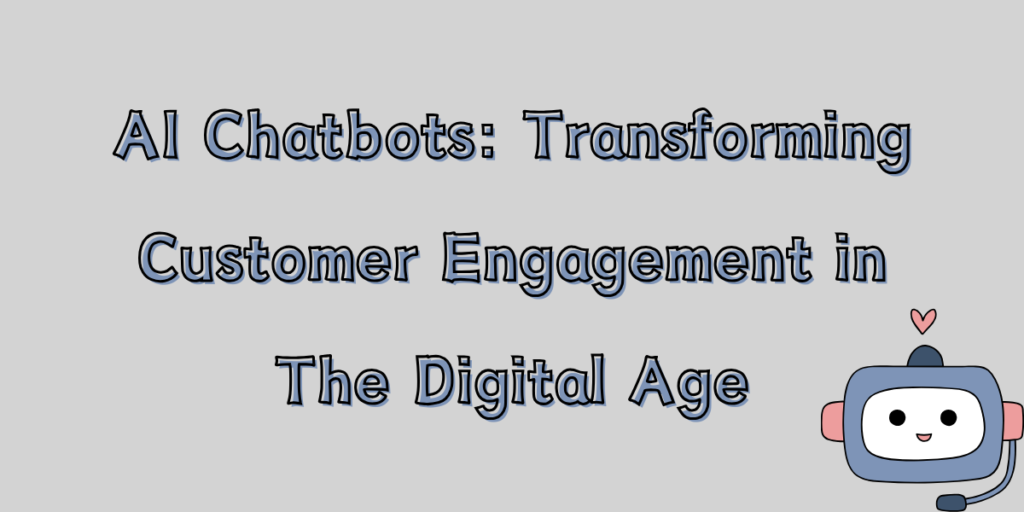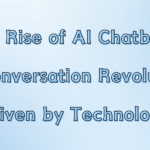Introduction
In today’s fast-paced digital landscape, businesses are constantly seeking innovative ways to enhance customer interactions. AI chatbots have emerged as a transformative tool, reshaping the way organizations engage with their customers. By leveraging advanced natural language processing (NLP) and machine learning algorithms, these bots can offer personalized, efficient, and round-the-clock service. This technological evolution isn’t just about improving response times; it’s about redefining customer experiences and building stronger, more meaningful relationships in the digital age.
What Are AI Chatbots?
AI chatbots are computer programs designed to simulate human conversation. Powered by artificial intelligence, they can interact with users in real-time, providing responses based on the input they receive. Unlike traditional chatbots that follow predefined scripts, AI chatbots are adaptive and can continuously improve by learning from interactions. From simple tasks to more complex customer needs, AI chatbots, including those in specialized areas like NSFW AI, are reshaping the digital experience across multiple platforms.
Common Functions of AI Chatbots
As AI chatbots continue to evolve, their functions have become more sophisticated, allowing businesses to handle a wide range of tasks efficiently. Below are some of the most common functions these chatbots offer:
Answering Frequently Asked Questions
AI chatbots excel at handling repetitive questions, offering quick and accurate answers to common inquiries.
- They can provide answers to product-related queries, operational hours, or return policies.
- By automating these responses, businesses can reduce human workload, ensuring more efficient service.
Assisting with Transactions
In addition to answering queries, AI chatbots can also guide users through transactions.
- They help with booking appointments, making purchases, or handling payments.
- This functionality ensures a seamless experience for customers looking to complete tasks quickly.
Providing Personalized Recommendations
AI chatbots use customer data to offer personalized suggestions.
- They analyze browsing history, preferences, and past interactions to recommend products or services.
- These tailored suggestions help enhance customer satisfaction and increase conversion rates.
Offering 24/7 Support
AI chatbots are available around the clock, ensuring customers receive assistance at any time.
- They eliminate the need for human agents to be available during off-hours.
- This continuous availability significantly improves the overall customer experience.
How Do AI Chatbots Improve Customer Engagement?
AI chatbots play a pivotal role in transforming customer engagement by making interactions faster, more personalized, and more accessible. Their ability to provide instant feedback and assistance creates a more dynamic and responsive customer service environment. From mainstream applications to more niche services like NSFW chat, chatbots cater to diverse audiences, enabling businesses to offer customized experiences that keep customers engaged and satisfied.
Enhancing Response Times
In the modern world, customers expect immediate assistance. AI chatbots enable businesses to meet these expectations by offering instant responses to customer queries. Whether it’s addressing a product-related question or solving a technical issue, chatbots ensure that customers don’t experience delays, which is crucial in maintaining satisfaction and engagement. Faster response times mean customers are more likely to stay loyal and trust the brand.
Delivering Personalized Experiences
AI chatbots have the unique capability of learning from user interactions. As they gather more data, they can provide increasingly personalized experiences. For example, they can greet returning customers by name, recommend products based on past purchases, or even remind users of items left in their shopping carts. This level of personalization helps businesses foster a deeper connection with their audience, leading to higher engagement rates.
Streamlining Multichannel Communication
Today’s customers interact with businesses across various platforms—social media, websites, apps, and messaging services. AI chatbots can seamlessly integrate with these multiple channels, ensuring consistent communication. Whether a customer initiates a conversation on Facebook Messenger or a company’s website, the chatbot ensures they receive the same high-quality interaction, thereby boosting engagement across touchpoints.
What Industries Benefit Most from AI Chatbots?
AI chatbots are versatile tools that can serve a wide array of industries. Their adaptability allows businesses across sectors to enhance their customer service and engagement efforts, ensuring a more seamless customer experience. Below are some industries that benefit the most from the implementation of AI chatbots:
- E-commerce: AI chatbots can guide customers through product recommendations, help with purchasing decisions, and answer frequently asked questions, boosting conversion rates.
- Healthcare: Chatbots assist patients by scheduling appointments, answering health-related questions, and providing information on services.
- Banking and Finance: AI chatbots in the financial sector help with balance inquiries, transaction histories, and even fraud detection, offering secure and quick assistance to clients.
- Travel and Hospitality: From booking flights to recommending local attractions, AI chatbots enhance the travel experience by offering instant solutions to travelers.
- Telecommunications: AI chatbots manage customer queries related to service plans, billing, and technical support, ensuring faster issue resolution.
What Are the Challenges of Implementing AI Chatbots?
While AI chatbots offer significant benefits, businesses must also navigate several challenges during implementation. For example, chatbots need to adapt to different contexts, including highly regulated industries or specialized niches like NSFW AI chat. Ensuring compliance with data privacy laws, overcoming integration issues, and maintaining the sophistication of natural language processing all remain pressing concerns for businesses adopting this technology. These obstacles can impact the effectiveness of chatbots if not properly addressed. Below are some key challenges faced by companies:
- Integration with Existing Systems: One of the most common hurdles is ensuring seamless integration with existing CRM systems, databases, and communication platforms. Poor integration can lead to inconsistent service.
- Natural Language Processing Limitations: While AI chatbots are becoming more sophisticated, they still struggle with understanding complex queries, nuances in language, or sarcasm. This can result in miscommunication and customer dissatisfaction.
- Maintenance and Updates: AI chatbots require regular updates and maintenance to stay relevant and effective. Businesses must continuously invest in refining algorithms to ensure their chatbot remains competitive.
- Privacy Concerns: As chatbots collect a wealth of customer data, businesses need to ensure they comply with data protection laws like GDPR. Mishandling data can lead to legal issues and loss of customer trust.
What Does The Future Hold for AI Chatbots?
The future of AI chatbots is brimming with potential. As artificial intelligence continues to advance, chatbots will become even more intuitive and capable. We can expect greater integration of voice recognition technologies, making interactions more natural and conversational. Additionally, as businesses continue to adopt AI-driven customer service solutions, chatbots will likely play a central role in automating more complex tasks, ultimately allowing for a seamless blend between human agents and AI-driven customer service. In the coming years, AI chatbots will undoubtedly continue to transform customer engagement across industries, setting new standards for service excellence.
Conclusion
AI chatbots have revolutionized customer engagement by making interactions more efficient, personalized, and accessible. From answering queries to providing personalized recommendations and round-the-clock support, they offer businesses a scalable way to enhance their service. While challenges such as integration and data privacy remain, the benefits far outweigh the obstacles. As we look to the future, AI chatbots will continue to evolve, providing even more innovative ways to connect with customers in the digital age.


